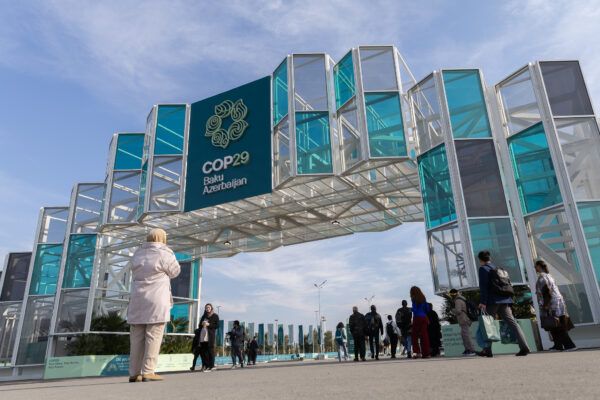No consensus, but blocs of ambition on fossil fuels and forests
As the COP30 UN climate negotiations close in Belém, Brazil, Clean Air Fund is disappointed that the outcome text does not reference the phasing out of fossil fuels, the single largest source of greenhouse gases and air pollution. Despite the lack of consensus, over 80 countries support a fossil fuel phaseout road map and the Brazilian Presidency will continue to lead this work during its COP Presidency term.
We welcome the announcement of the First International Conference for the Phase-Out of Fossil Fuels, hosted by Colombia and Netherlands in April 2026. We urge ambitious countries to move forward together on a full, fair and fast fossil fuel phaseout.
We applaud over 90 countries’ support for a roadmap on halting and reversing deforestation, as well as the recognition of wildfires as a major source of emissions that need sustainable and locally-led management. Forest fires represent 20% of global black carbon emissions and are a major source of air pollution.
The standoff puts big pressure on the remainder of the Brazilian COP presidency to deliver on these two roadmaps and bring more countries on board by COP31 in Antalya, Türkiye.
The ‘Implementation COP’ delivers on super pollutants
For the first time, the COP Action Agenda addressed super pollutants. Alongside formal negotiations, this agenda and several new initiatives helped catalyse high-level leadership on cutting super pollutant emissions. Governments announced action across waste, agriculture, oil and gas, transport and residential sectors:
- Black carbon is back on the global climate stage. Countries made a first-of-its-kind announcement to tackle major sources of black carbon emissions. Nine governments revealed national policies and sectoral actions to advance action on black carbon. They also agreed to collaborate through a peer network on technical exchange, shared learning, and joint advocacy.
- The Climate and Clean Air Coalition (CCAC) announced its Super Pollutants Country Action Accelerator, which aims to support 30 low- and middle-income countries to drastically cut super pollutants by 2030 by scaling up implementation.
- A shared commitment on drastically reducing methane in the global fossil fuel sector and the NOW! (No Organic Waste) Initiative highlight countries’ leadership to reduce methane emissions in two key sectors, aiming to close the gap on delivering the Global Methane Pledge. Methane is an important precursor to tropospheric ozone, a potent air pollutant that harms human health. However, other tropospheric ozone precursors received limited attention, revealing a stark gap in climate accounting.
Cutting super pollutants is our emergency brake on near-term warming. We can avoid 0.6°C of warming by 2050 by tackling super pollutants, such as methane, black carbon and tropospheric ozone, while reducing carbon dioxide emissions. The increased attention on super pollutants at COP30 shows ambition on climate and health is growing.
Jane Burston, CEO of Clean Air Fund
Countries’ climate plans fall short, but ambition on super pollutants grows
The national climate plans, or Nationally Determined Contributions (NDCs), submitted by governments this year don’t contain the critical measures needed to keep global warming to 1.5°C. Current global warming projections for this century are off target at 2.8°C, according to the UNEP Emissions Gap Report 2025.
However, we welcome that more NDCs are addressing super pollutants, air quality and health measures. The CCAC’s analysis of the latest NDCs compared to pre-2020 ones shows:
- Measures to address methane have increased by 22%.
- The inclusion of black carbon targets has doubled.
- Actions to address non-methane precursor pollutants, which form tropospheric ozone, have tripled.
New plans and finance for climate and health
COP30 saw the launch of the Belém Health Action Plan, which focuses on ensuring health systems are adapted to climate challenges. Leaders argued that progress should be judged as lives and livelihoods saved, not just reductions in greenhouse gas emissions. In particular, the action plan recommends that early warning health systems cover air pollution and acknowledges the short- and longer-term benefits of clean air.
While we welcome the Health Action Plan, governments need to go further to truly put health at the heart of climate negotiations next year. Several leaders, including WHO Director-General Dr Tedros Adhanom Ghebreyesus, called for health to be included in formal negotiations in future COPs. It is essential adaptation and mitigation consider climate change and health.
We welcome the COP30 outcome text’s acknowledgement of the “economic and social benefits and opportunities of climate action, including… improved public health” – a step in the right direction.
Over 35 philanthropic funders also pledged US$300 million of funding to accelerate health and climate action at the COP30 Health Day. Air pollution, including super pollutants, will be one of the areas of focus for the new funding, a testament to philanthropic foundations’ recognition of clean air as an investment that catalyses climate, health and economic benefits.
G20 recognises the importance of action on air pollution and climate change
The G20 leaders’ declaration was also agreed today, noting the importance of tackling climate change and the risks from poor air quality. G20 leaders endorsed the historic G20 Cape Town Declaration on Air Quality, which was drawn up by G20 Environment Ministers in October.
The declaration highlights the importance of collaboration by G20 members and the wider international community to improve monitoring and access to open, reliable air quality data. It also calls for cooperation on transboundary pollution and sharing technologies to scale up support for the most vulnerable communities affected by air pollution. It also proposes further technical cooperation and information sharing among G20 members. These are the right building blocks for faster, fairer progress.
Looking ahead to COP31
Countries should look to bring concrete commitments for a fair and fast phase out of fossil fuels to the Fossil Fuel Treaty conference in Colombia in April, recognising that reducing countries’ use of fossil fuels and simultaneously reducing air pollution is a triple win for climate, health and economies.
Momentum on super pollutants must also continue into COP31, with action on all non-CO2 pollutants including black carbon. Countries can build on the progress at COP30 with further commitments to cooperate and act on major sectors for super pollutants. A Super Pollutants Day would help to draw attention to this critical issue for climate and health.


